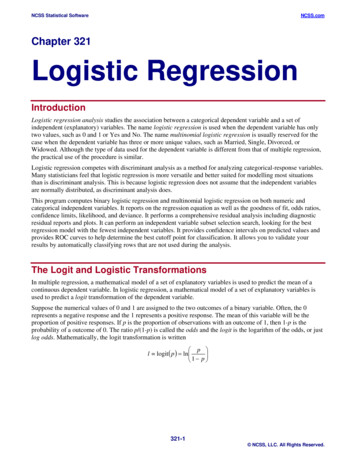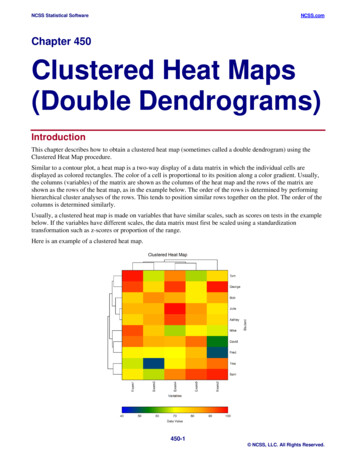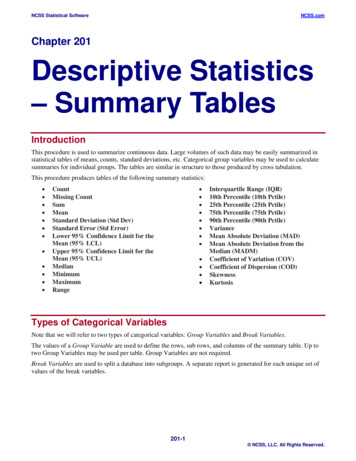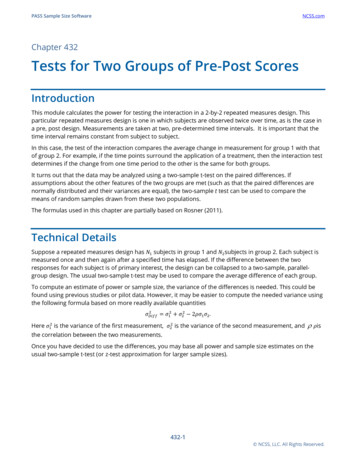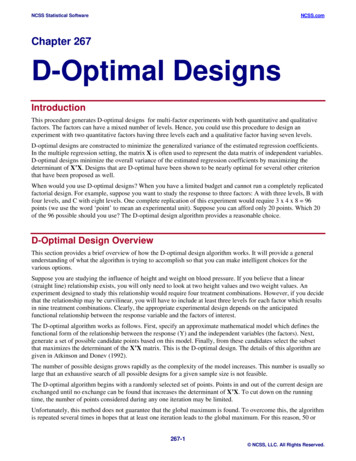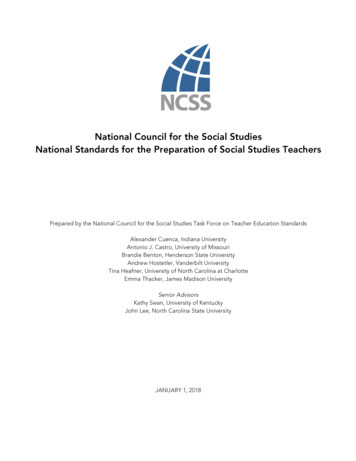
Transcription
National Council for the Social StudiesNational Standards for the Preparation of Social Studies TeachersPrepared by the National Council for the Social Studies Task Force on Teacher Education StandardsAlexander Cuenca, Indiana UniversityAntonio J. Castro, University of MissouriBrandie Benton, Henderson State UniversityAndrew Hostetler, Vanderbilt UniversityTina Heafner, University of North Carolina at CharlotteEmma Thacker, James Madison UniversitySenior AdvisorsKathy Swan, University of KentuckyJohn Lee, North Carolina State UniversityJANUARY 1, 2018
NCSS National Standards for the Preparation of Social Studies Teachers2
TABLE OF CONTENTSFOREWORDKathy Swan, John Lee, and S.G. Grant 5INTRODUCTION7OverviewBackgroundAmbitious Teaching: A Vision for Social Studies Teaching/Teacher EducationAudiencesDocument OrganizationAssessments77881011STANDARDS13Standard 1. Content KnowledgeStandard 2. Application of Content Through PlanningStandard 3. Design and Implementation of Instruction and AssessmentStandard 4. Social Studies Learners and LearningStandard 5. Professional Responsibility and Informed Action1315182225GLOSSARY29EVIDENCE GUIDE32REFERENCES51NCSS National Standards for the Preparation of Social Studies Teachers3
NCSS National Standards for the Preparation of Social Studies Teachers4
FOREWORDKathy Swan, John Lee, and S.G. GrantStandards work is not for the faint of heart. When the College, Career, and Civic Life Framework for Social StudiesState Standards (“C3 Framework”) was published in 2013, the writers knew that there would be a long road aheadif the document was to make a difference for social studies. First, state departments of education would need toincorporate the C3 Inquiry Arc into what is often an arduous state standards adoption process. And, they wouldneed to do this against the backdrop of Common Core fatigue and without a national mandate or externalincentive to do so. Second, even if a quorum of states adopted the C3 Framework in some shape or form, theideas put forth in the document (e.g., inquiry, civic action, disciplinary and interdisciplinary practices) requiredadditional systemic supports. Teachers would need to have clear curricular models and instructional materials thatwould help them do C3 inquiry, and social studies students would need to be evaluated on the disciplinarythinking skills animated within the inquiry arc. In other words, it wasn't enough to create a hit song; we need anentire catalog of music, a variety of venues, lighting and sound experts, and marketing to pull off a concert seriesthat could usher in a new genre of social studies.The good news is that the C3 concert series is taking shape. Under the capable leadership of Alex Cuenca and histeam, these new national standards for teacher preparation explicitly reinforce the ideas that are outlined in theC3 Framework. In the introduction, they write, “As the statement on what meaningful and powerful social studiesinstruction ought to look like, the C3 Framework served for the 2016 committee as the milestone for the kinds ofknowledge, skills, and dispositions social studies teacher preparation programs are required to cultivate (p. 8).”Thus, each of the five anchor standards, or core competencies, outlined in the document is infused with thelanguage and ethos of the C3 Framework. For example, in defining the Content Knowledge—Standard 1—thewriters included the content and skills from the core social studies disciplines (Dimension 2) as well as the inquirypractices essential to a meaningful social studies education (Dimensions 1, 3, 4). In doing so, this writingcommittee has sent a clear and cohesive message to teacher educators, the pre-service teachers they work with,and the larger social studies community that the C3 Framework is not a one-hit wonder but a broader, moreambitious initiative that aims to impact every facet of social studies education.NCSS National Standards for the Preparation of Social Studies Teachers5
NCSS National Standards for the Preparation of Social Studies Teachers6
INTRODUCTIONOVERVIEWThe National Standards for the Preparation of Social Studies Teachers describe and explain the nationalstandards for social studies teacher education created by the National Council for the Social Studies (NCSS).These standards were approved by the NCSS Board of Directors in March, 2016. This document consists of twosections: (1) an introduction, which contains, in addition to this overview, information about the background andcontexts in which the standards were developed, a description of the audiences to which the standards areaddressed, and the general framework that guided the construction of the standards; and (2) the standardsthemselves with a supporting rationale. The standards outline the social studies content, pedagogical knowledge,skills, and dispositions needed in order to prepare ambitious social studies teachers.BACKGROUNDFor several decades, the National Council for the Social Studies has published standards for the preparation ofsocial studies teachers. The last set of standards was released in 2002. Whereas earlier versions focused onprescribing programmatic components (e.g., coursework), the 1997 and 2002 standards represented a shift inemphasis. The twenty standards articulated in the 2002 edition focused the efforts of social studies teachereducation on the ability of candidates to demonstrate subject matter knowledge and perform professionally. Theshift was predicated on trends in 2002 that guided conversations around social studies and teacher preparation,such as the national move toward greater accountability for schools, teachers, and teacher education programs,efforts by state teacher licensure offices, the Interstate New Teacher Assessment and Support Consortium(InTASC), the National Council for the Accreditation of Teacher Education (NCATE), the National Board forProfessional Teaching Standards (NBPTS), and other subject matter professional teacher associations. Mostnotably, the 2002 standards were influenced by the 1994 NCSS document, Expectations of Excellence: CurriculumStandards for Social Studies, which described what NCSS expected pre-K-12 learners should know and be able todo through ten thematic standards (NCSS, 1994).While the 2016 committee continued the efforts of previous committees, the five standards and twenty-oneelements found in this document are also responsive to the contemporary demands placed upon social studiesteacher preparation programs. Although many of the trends that were emerging in 2002, such as InTASC,continue to influence the preparation of teachers, the most palpable change is the more critical stance that thepublic has adopted toward teacher education. The last decade has featured a steady stream of blisteringcritiques from government agencies, education advocacy groups, and the media lamenting the quality of teacherpreparation. The persistent framing of teacher preparation as a “problem” has led to efforts to further regulatethe curriculum of teacher education, increase the surveillance of programs through public accountability,introduce new content, dispositional, and performance assessments, and create new licensure routes that bypasstraditional preparation pathways. As various institutions, groups, and individuals struggle over the power todetermine quality teacher preparation, each successive wave of reform influences not just the structuralcharacteristics of teacher education, but also the range of norms, values, and ideas possible within teachereducation and about social studies education.Within this milieu, the NCSS National Standards for the Preparation of Social Studies Teachers makes a claim forthe professionalization of the field of social studies teacher education by outlining the characteristics of qualitypreparation. In doing so, this document features explicit and implicit declarations about the purposes of socialstudies education in a democratic society and the kinds of knowledge, skills, and dispositions needed for teachersNCSS National Standards for the Preparation of Social Studies Teachers7
to accomplish these purposes.What binds purpose, preparation, and practice together in this document is the College, Career, and Civic Life(C3) Framework for Social Studies State Standards, released in 2013 (NCSS, 2013). The C3 Framework is a set ofinterlocking and mutually reinforcing dimensions of practice that focus on the intersection of inquiry, ideas, andlearners. As a collaborative effort that began in 2010, the C3 Framework was built on the following sharedprinciples: (1) social studies prepares the nation’s young people for college, careers, and civic life; (2) inquiry is atthe heart of social studies; (3) social studies involves interdisciplinary applications; (4) social studies is composedof deep and enduring understandings, concepts, and skills from the disciplines; and (5) social studies emphasizesskills and practices for democratic decision-making.The four dimensions of the Inquiry Arc in the C3 Framework center on the use of questions to spark curiosity,guide instruction, and deepen investigations, enabling students to acquire rigorous content, and to develop theirknowledge and ideas in real-world settings in order to become active and engaged citizens in the twenty-firstcentury. As the statement on what meaningful and powerful social studies instruction ought to look like, the C3Framework served for the 2016 committee as the milestone for the kinds of knowledge, skills, and dispositionssocial studies teacher preparation programs are required to cultivate. Each standard outlined in this document isframed by the ethos of the C3 Framework—to enhance the rigor of social studies education by building thecritical thinking, problem solving, and participatory skills that enable students to become informed citizens.AMBITIOUS TEACHING: A VISION FOR SOCIAL STUDIES TEACHING/TEACHER EDUCATIONA variety of excellent models for the teaching of social studies exist, such as historical inquiry (Levstik & Barton,2010; VanSledright, 2010); issues-centered teaching (Engle & Ochoa, 1988); authentic social studies education(King, Newman, & Carmichael, 2009), social studies for social justice (Wade, 2007); and forms of global citizenshipeducation (Merryfield & Wilson, 2005; Parker, 2003). All of these models however are exemplified through tenetsof ambitious teaching. S. G. Grant and Jill Gradwell (2010) defined ambitious social studies teachers as those who:(1) know their subject matter well and see within it the potential to enrich their students’ lives; (2) know theirstudents well, which includes the kinds of lives their students lead, how these youngsters think about and perceivethe world, and that they are far more capable than they and most others believe them to be; and (3) know how tocreate the necessary space for themselves and their students in environments in which others (e.g.,administrators, other teachers) may not appreciate their efforts (p. 2).Each of the standards and elements in this document makes an effort to delineate the kinds of knowledge, skills,and dispositions necessary to cultivate ambitious social studies teachers. This particular vision of social studieseducation offers important guideposts for teacher educators as they consider programmatic goals andcurriculum. As Grant (2005) suggests, “ambitious teaching represents no endpoint, but rather a journey in whichteachers face and negotiate challenges and conditions along the way” (p. 129). As such, ambitious teachingdemands ambitious teacher education. The work of social studies teaching must be cast as complex anduncertain, demanding pragmatic action. Guided by the vision of ambitious teaching, these standards call onsocial studies teacher education programs to design experiences that help candidates recognize how subjectmatter, students, and contexts influence each other in the interest of preparing youth to assess and work againstbarriers and challenges that impede democratic life (Castro & Knowles, 2016). Learning to teach ambitiously inteacher education programs will allow future social studies teachers to face the enduring and unknown challengesof education in ways that generate powerful experiences for social studies learners.AUDIENCESThe standards in this document are intended for the potential use of a number of different audiences who areresponsible for assuring the quality of social studies teachers. These audiences include:NCSS National Standards for the Preparation of Social Studies Teachers8
Teacher preparation programs within institutions that prepare teachers for initial licensure (orcertification) and recommend for state licensure (or certification) those who complete their programsuccessfully;State agencies that approve teacher education programs at higher education institutions;State licensure (or certification) offices that grant licenses (or certificates) that attest to a teacher’s quality;Prospective social studies teachers;Researchers in social studies education;Students, parents, and citizens who seek assurance that the social studies teachers in their schools andcommunities are knowledgeable and capable.Teacher Preparation ProgramsFor teacher preparation programs, these standards serve as the benchmarks for programs seeking nationalrecognition from the National Council for the Social Studies. Each standard in this document is accompanied by aset of key assessments that evidence candidate mastery of standards and demonstrate how programs meet thevarious elements that constitute each standard. This evidence is evaluated by a set of NCSS reviewers, obligatedto determine if a program meets these standards.Although the use of these standards to determine national recognition is a primary function of these standards,they are also important for teacher preparation programs that opt out of this process. The field of “social studiesteacher preparation” exists in various configurations. The spectrum of social studies teacher preparation rangesfrom places where programs are an isolated social studies methods course, practicum, and student teachingexperience to programs where courses are carefully sequenced into topics such as social studies curriculum,social studies methods, social studies literacies, and/or inquiry within specific social studies disciplines. Thiscoursework is often coupled with intentional practicum placements and student teaching experiences in socialstudies classrooms. Given the compositional variety of the field, these standards serve as a unifying documentthat expresses the aims and purposes of social studies teacher education. Therefore, even for programs that donot undergo the program review process, these standards ought to serve as a tool for reflection, programrefinement, and professional development.State AgenciesState agencies that approve social studies teacher preparation programs may use these standards as the criteriaby which they evaluate the programs they review. Also, state officials that grant licenses (or certification) to socialstudies teachers that attest to those teachers’ competence may use these standards as the criteria by which theyevaluate individual applicants’ capabilities.Prospective Social Studies TeachersIndividuals preparing to become ambitious social studies teachers may use these standards as guidance in (1)choosing the university or college and teacher preparation program they might attend; (2) selecting courses andlearning experiences that would serve them well as teachers; and (3) identifying personal professionalcharacteristics they might develop in order to teach well.Social Studies ResearchersThese standards should serve as a call to social studies education researchers to empirically explore the mosteffective ways for social studies teacher preparation programs to deploy the knowledge, skills, and dispositionsoutlined in this document.Students, Parents, CitizensStudents, parents, and citizens may use these standards as criteria for assessing the social studies knowledge andcapabilities of the social studies teachers in their schools and communities.NCSS National Standards for the Preparation of Social Studies Teachers9
DOCUMENT ORGANIZATIONThe disciplinary-inquiry driven classroom, where students practice the habits of civic life, is what this documentenvisions ought to be the outcome of social studies teacher preparation. Therefore, the NCSS National Standardsfor the Preparation of Social Studies Teachers are organized along five key principles of social studies teachingand learning: content knowledge; application of content through planning; design and implementation ofinstruction and assessment; social studies learners and learning; and professional responsibility and informedaction. These five principles serve as the organizing framework for the core competencies expected of qualitysocial studies teacher preparation programs.Five Core Competencies for Social Studies Teacher EducationStandard 1. Content KnowledgeCandidates demonstrate knowledge of social studies disciplines. Candidates are knowledgeable of disciplinaryconcepts, facts, and tools; structures of inquiry; and forms of representation.Standard 2. Application of Content Through PlanningCandidates plan learning sequences that leverage social studies knowledge and literacies, technology, andtheory and research to support the civic competence of learners.Standard 3. Design and Implementation of Instruction and AssessmentCandidates design and implement instruction and authentic assessments, informed by data literacy and learnerself-assessment, that promote civic competence.Standard 4. Social Studies Learners and LearningCandidates use knowledge of learners to plan and implement relevant and responsive pedagogy, createcollaborative and interdisciplinary learning environments, and prepare learners to be informed advocates for aninclusive and equitable society.Standard 5. Professional Responsibility and Informed ActionCandidates reflect and expand upon their social studies knowledge, inquiry skills, and civic dispositions toadvance social justice and promote human rights through informed action in schools and/or communities.This document is organized around the five core competencies. Each standard is refined through a set of three tofive elements that add depth and detail to the knowledge, skill, or disposition expressed in the standard.Together, each standard and element describes an aspect of quality social studies teaching and learning.Following the standard and supporting elements, readers will find a rationale that articulates the knowledge baseand informed theories in social studies education, teacher education, and/or teaching and learning that thecommittee utilized to develop the standard. Throughout the standards, readers will find key terms, concepts, orphrases highlighted that are referenced in a glossary at the end of this document.NCSS is the specialized professionalized association (SPA) recognized by the Council for the Accreditation ofEducator Preparation (CAEP) that represents the teachers and professional education faculty in the United Stateswho teach social studies education. These standards serve as the guiding document to evaluate and recognizequality preparation of social studies teachers. In order to achieve this recognition, programs must provide apreponderance of evidence that every standard is met. However, recognition will not require that every elementwithin each standard is met, just an overall confirmation that the candidates meet a majority of the elements inthe strength, weight, or quality of the evidence provided. Because these standards serve as the guidingdocument for the NCSS program review process, every standard features an EVIDENCE section that indicateswhich of the six key assessments or other acceptable assessments provide evidence for each standard.NCSS National Standards for the Preparation of Social Studies Teachers10
ASSESSMENTSThe six key assessment types are determined by the Council for the Accreditation of Educator Preparation andrequired of all specialized professional associations. Many of the key assessments are comprehensive enough toaddress multiple standards outlined in this document. Every standard concludes with a Summary Matrix thatdetails the standard, element, and evidence alignment.Assessment 1: State or Professional Exam DataCAEP requires its accredited and candidate institutions to maintain an 80 percent (minimum) pass rate on all statelicensure exams. Programs are required to submit state licensure exams data (when applicable) for all completedsocial studies teacher candidates that demonstrate mastery of social studies content knowledge.Assessment 2: Assessment of Content Knowledge in Social StudiesState and professional exam data is only one way to measure content knowledge. Programs are required toprovide an additional measure of how social studies teacher candidates master content knowledge, such ascomprehensive examinations, course grades in social studies content courses, or portfolios that demonstratecandidates’ social studies content knowledge.Assessment 3: Candidate Ability to Plan for Social Studies InstructionPlanning for social studies instruction is an essential component of being an instructional gatekeeper (Thornton,2008). Programs are required to provide an assessment instrument that demonstrates the ability of candidates toplan social studies instruction such as lesson plans, unit plans, need assessments, and/or other planning tasks.Assessment 4: Assessment of Student Teaching in Social StudiesStudent teaching in social studies teacher education is designed to cultivate teacher candidates’ professionalidentities and pedagogical repertoires within a situated classroom setting (Crowe & Cuenca, 2016). Programs arerequired to provide evidence about the quality of the student teaching experience, such as assessments ofperformance in the field, examples of student work, and candidates’ reflection essays.Assessment 5: Candidate Impact on Student LearningThe preparation of teacher candidates able to positively impact student learning ought to be one of the primaryoutcomes of social studies teacher education. Programs must provide assessment data to demonstrate thecandidate’s impact on student learning such as student work samples, portfolio tasks, case studies, or classroomaction research studies.Assessment 6: Assessment of Professional Responsibility and Informed ActionThe C3 Framework calls on social studies educators to provide students with “opportunities to adapt and applytheir work in the disciplines that constitute the social studies in order to develop the skills and dispositionsnecessary for an active civic life” (p. 59). This definition of informed action frames civic engagement as both ameans and end of learning and applying social studies knowledge. In order to fulfill this significant pedagogicalresponsibility, social studies teachers must be informed and active citizens. Programs must provide an assessmentthat measures how candidates are actively participating as citizens in the public arena, such as a service learningproject or social justice action research.NCSS National Standards for the Preparation of Social Studies Teachers11
NCSS National Standards for the Preparation of Social Studies Teachers12
STANDARDSStandard 1.Content KnowledgeCandidates demonstrate knowledge of social studies disciplines. Candidates are knowledgeable ofdisciplinary concepts, facts, and tools; structures of inquiry; and forms of representation.Element 1a: Candidates are knowledgeable about the concepts, facts, and tools in civics, economics, geography,history, and the social/behavioral sciences.Element 1b: Candidates are knowledgeable about disciplinary inquiry in civics, economics, geography, history,and the social/behavioral sciences.Element 1c: Candidates are knowledgeable about disciplinary forms of representation in civics, economics,geography, history, and the social/behavioral sciences.Standard 1 requires that social studies teacher education candidates be knowledgeable about social studiescontent and are able to place this knowledge within the context of the various forms of disciplinary inquiryinherent in social studies disciplines. Without the events, the names, the dates, the places, and the ideas both bigand small, social studies would lack meaning and purpose. Indeed, social studies content knowledge anddisciplinary inquiry provide the foundation for civic life. The College, Career and Civic Life (C3) Framework forSocial Studies State Standards (“The C3 Framework”) establishes four core disciplines as the “intellectual contextfor studying how humans have interacted with each other and with the environment over time. Each of thesedisciplines--civics, economics, geography, and history--offers a unique way of thinking and organizing knowledgeas well as systems for verifying knowledge” (p. 29). Therefore, social studies teachers must possess rich contentknowledge. Understanding the unique disciplinary concepts, facts, and tools that animate social studies,including the core areas of civics, economics, geography, and history, and the social/behavioral sciences, enablesthe intellectual capacity to examine interdisciplinary complexities of our social world.The C3 Framework describes the structure of inquiry as unfolding along an Inquiry Arc. Social studies teachercandidates must understand how the disciplines--civics, economics, geography, and history, and thesocial/behavioral sciences--create knowledge through disciplinary inquiry to inform action in civic life. Disciplinaryinquiry is built on the theoretical and discipline-specific ways of knowing that characterize a subject matter. Thus,teacher education candidates must understand the fundamental components of disciplinary inquiry includingquestioning, gathering and evaluating sources, developing claims and using evidence, communicatingconclusions, and taking informed action.Scholars in social studies disciplines leverage unique inquiry literacies--strategies, routines, skills, language, orpractices--for making meaning of content. The culmination of disciplinary inquiry yields disciplinary forms ofrepresentation, which refer to the products of these specialized practices and the norms of sharing informationtied to the specific discipline. Teacher education candidates know and replicate scholarly ways of communicatingconclusions in the social studies disciplines.NCSS National Standards for the Preparation of Social Studies Teachers13
In sum, for social studies teacher education candidates to facilitate, sustain, and assess meaningful social studiesinquiries with learners, they must possess knowledge about relevant concepts, facts, and tools; they mustunderstand how that content is created through disciplinary inquiry; they must be fluent in the methods of thosedisciplines and the ways conclusions of inquiry are communicated through disciplinary forms of representation;and they must understand how to use knowledge from social studies to inform civic life.EVIDENCEEvidence for Standard 1 can be provided through Assessment 1: State or Professional Exam Dataand Assessment 2: Assessment of Content Knowledge in Social Studies. Assessment 1 is state licensure orprofessional exam data that addresses content knowledge in social studies education. Assessment 2 is furtherevidence of candidate mastery of social studies content knowledge. Examples of assessments could includecomprehensive examinations, course grades in social studies content courses, or portfolios that demonstratecandidates’ social studies content knowledge.SUMMARY MATRIXStandard 1. Content KnowledgeELEMENTSCandidates demonstrate knowledge of social studies disciplines. Candidatesare knowledgeable of disciplinary facts, concepts, and tools; structures ofinquiry; and forms of representation.EvidenceAlignmentElement 1aCandidates are knowledgeable about the concepts, facts, and tools in civics,economics, geography, history, and the social/behavioral sciences.Assessments 1, 2Element 1bCandidates are knowledgeable about disciplinary inquiry in civics,economics, geography, history, and the social/behavioral sciences.Assessments 1, 2Element 1cCandidates are knowledgeable about disciplinary forms of representation incivics, economics, geography, history, and the social/behavioral sciences.Assessments 1, 2NCSS National Standards for the Preparation of Social Studies Teachers14
Standard 2.Application of Content Through PlanningCandidates plan learning sequences that leverage social studies knowledge and literacies, technology, andtheory and research to support the civic competence of learners.Element 2a: Candidates plan learning sequences that demonstrate social studies knowledge aligned with the C3Framework, state-required content standards, and theory and research.Element 2b: Candidates plan learning sequences that engage learners with disciplinary concepts, facts, andtools from the social studies disciplines to facilitate social studies literacies for civic life.Element 2c: Candidates plan learning sequences that engage learners in disciplinary inquiry to develop socialstudies literacies for civic life.Element 2d: Candidates plan learning sequences where learners create disciplinary forms of representation thatconvey social studies knowledge and civic competence.Element 2e: Candidates plan learning sequences that use technology to foster civic competence.Standard 2 focuses on cultivating the abilities of teacher candidates to plan ambitious learning sequences thatdraw upon social studies knowledge and literacies to support the civic competence of all learners. Ambitioussocial studies teachers (Brophy, 1993; Grant, 2003) push beyond teaching isolated disciplinary content and towardteaching integrated concepts, facts,
NCSS National Standards for the Preparation of Social Studies Teachers 8 to accomplish these purposes. What binds purpose, preparation, and practice together in this document is the College, Career, and Civic Life (C3) Framework for Social Studies State Standards, released in 2013 (NCSS, 2013).The C3 Framework is a set of


